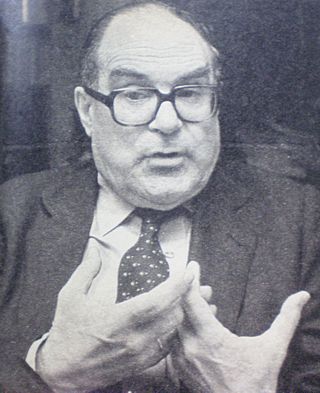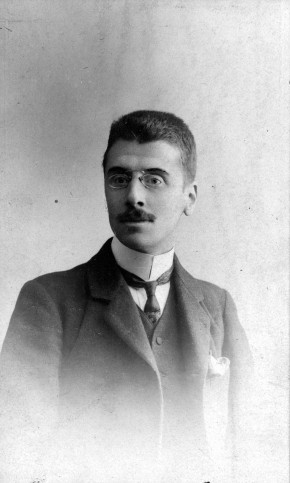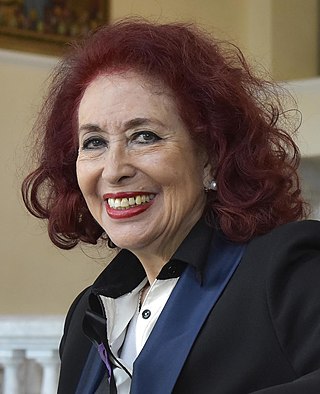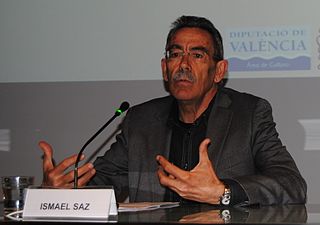Related Research Articles

Fernando Fernández-Savater Martín is a Spanish philosopher, essayist and author.

Francisco Ayala García-Duarte was a Spanish writer, the last representative of the Generation of '27.

Julián Marías Aguilera was a Spanish philosopher associated with the Generation of '36 movement. He was a pupil of the Spanish philosopher José Ortega y Gasset and member of the Madrid School.

Antonio Fernández Resines is a Spanish film and television actor.

Gabriel Arias–Salgado Montalvo was a Spanish politician of Falangist ideology, who held positions during the Franco dictatorship.
Vicente Alejandro Guillamón was a Spanish journalist and writer.

Francisco Javier Rupérez Rubio is a Spanish politician, diplomat and writer, was born in Madrid on 24 April 1941. He holds degrees in law (1962) and journalism (1975) from the Complutense University of Madrid. Since 2006 he has held the rank of full Ambassador within the Spanish Diplomatic Service, which he joined in 1967.

Juan Antonio Villacañas was a Spanish poet, essayist and critic. In 2015, he was named distinguished son of the city of Toledo.

Julián Juderías y Loyot was a Spanish historian, sociologist, literary critic, journalist, translator and interpreter.

Rafael Gambra Ciudad was a Spanish philosopher, a secondary education official, a Carlist politician and a soldier. In philosophy he is considered key representative of late Traditionalism; his works fall also into theory of state and politics. He is best known as author of books focusing on secularisation of Western European culture in the consumer society era. As a politician he is acknowledged as a theorist rather than as an active protagonist, though after 2001 he briefly headed one of the Carlist branches.

Juan Carlos Monedero Fernández-Gala is a Spanish political scientist and writer. He is a professor at the Complutense University of Madrid and a host of La Tuerka. He was one of the leading members of Podemos until he resigned in April 2015.

Traditionalism is a Spanish political doctrine formulated in the early 19th century and developed until today. It understands politics as implementing the social kingship of Jesus Christ, with Catholicism as the state religion and Catholic religious criteria regulating public morality and every legal aspect of Spain. In practical terms it advocates a loosely organized monarchy combined with strong royal powers, with some checks and balances provided by organicist representation, and with society structured on a corporative basis. Traditionalism is an ultra-reactionary doctrine; it rejects concepts such as democracy, human rights, constitution, universal suffrage, sovereignty of the people, division of powers, religious liberty, freedom of speech, equality of individuals, and parliamentarism. The doctrine was adopted as the theoretical platform of the Carlist socio-political movement, though it appeared also in a non-Carlist incarnation. Traditionalism has never exercised major influence among the Spanish governmental strata, yet periodically it was capable of mass mobilization and at times partially filtered into the ruling practice.

Lidia Falcón O'Neill is a Spanish politician and writer. With a degree in law, dramatic art, and journalism, and a PhD in philosophy, she has stood out for her defense of feminism in Spain, especially during the Transition.
Francisco Javier Sánchez Cantón (1891–1971) was a Spanish art historian, who from 1960 to 1968 was Director of the Museo del Prado.

Santiago Muñoz Machado is a Spanish jurist and academic, director of the Royal Spanish Academy and the Association of Academies of the Spanish Language since 10 January 2019. As a jurist, he specialized in administrative and constitutional rights. He is also a member of the Royal Academy of Moral and Political Sciences and editor of the Diccionario del español jurídico and the Diccionario panhispánico del español jurídico.

José Félix Tezanos Tortajada is a Spanish sociologist, politician, and professor. He serves as President of the Centro de Investigaciones Sociológicas (CIS) since 2018.
José María Marco Tobarra is a Spanish essayist and liberal-conservative opinion journalist.

Ismael Saz Campos is a Spanish historian, specialised in the study of Falangism, Francoist Spain and the Spanish-Italian relations during the Spanish Civil War. He is a professor at the University of Valencia.

Onésimo Díaz Hernández is a Spanish historian known for his publications regarding the history of Spain in the twentieth century.
References
- Diccionario Biográfico Español Contemporáneo, Círculo de Amigos de la Historia, Madrid 1970, vol. 1, p. 361.
